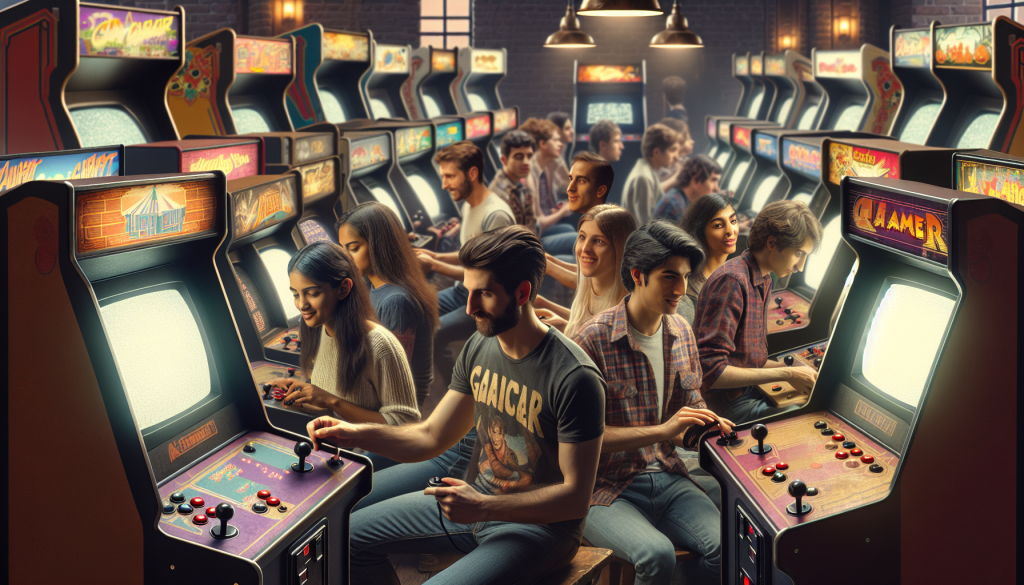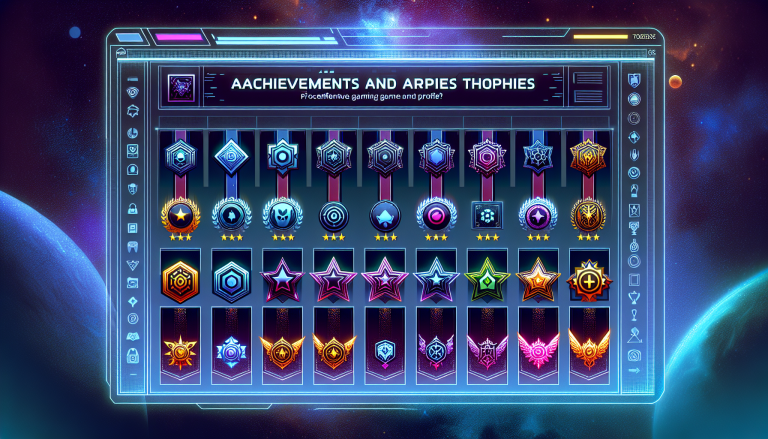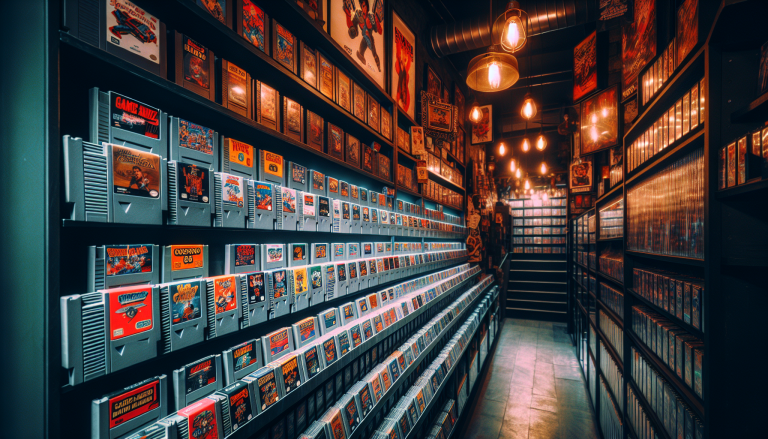Introduction to Documenting the History of Iconic Game Series
Gaming has become a significant part of our modern culture, with iconic game series leaving a lasting impact on both players and the industry as a whole. From the whimsical adventures of Super Mario to the immersive worlds of The Legend of Zelda, these games have become cherished classics that continue to captivate new generations of gamers.
But have you ever wondered about the fascinating stories behind the development of these beloved games? How did the game designers come up with the innovative concepts? What challenges did they face during production? How did these games shape the gaming industry and influence popular culture?
Documenting the history of iconic game series is not only a way to pay homage to these masterpieces but also a means of preserving gaming heritage for future generations. By delving into the development process, understanding the cultural impact, and sharing the legacy of these games, we can gain a deeper appreciation for the artistry and ingenuity that goes into creating these virtual worlds.
So, let’s embark on a journey to uncover the untold stories and hidden gems of the gaming industry. By researching and documenting the development of classic games, we can gain valuable insights into the creative process and the evolution of game design.
Researching the Development of Classic Games
To understand how iconic game series came to be, it is essential to dive into the development process. This involves examining the initial ideas and concepts, the technical challenges faced by the developers, and the milestones achieved along the way.
One way to research the development of classic games is by exploring interviews and behind-the-scenes documentaries with the game designers themselves. These firsthand accounts provide valuable insights into the creative thinking and decision-making that shaped the final product.
Additionally, analyzing concept art, design documents, and early prototypes can offer a glimpse into the iterative process of game development. It allows us to see how ideas evolved, how features were refined, and how the game’s visual style and mechanics were crafted.
By immersing ourselves in the development history of classic games, we not only gain a deeper understanding of the games themselves but also appreciate the dedication, passion, and innovation that brought them to life.
Compiling the Cultural Impact of Iconic Game Series
Iconic game series often transcend the boundaries of entertainment, becoming cultural phenomena that shape popular culture. From influencing fashion trends to inspiring fan art and fan fiction, these games have a far-reaching impact on society.
To compile the cultural impact of iconic game series, we can explore fan communities, online forums, and social media platforms where players discuss their experiences and share their love for the games. These discussions offer valuable insights into how the games have touched the lives of players and contributed to their personal growth.
Furthermore, examining critical reviews, academic studies, and articles written about these games allows us to understand their broader significance. We can analyze how they pushed the boundaries of storytelling, gameplay mechanics, and technical innovation, influencing the direction of the gaming industry as a whole.
By compiling the cultural impact of iconic game series, we not only recognize their artistic and entertainment value but also acknowledge their role in shaping our collective experiences and fostering a sense of community among gamers.
Sharing and Preserving the Legacy of Classic Games
Preserving the legacy of classic games is crucial to ensure that future generations can appreciate and learn from these influential works. By sharing our knowledge and experiences, we can keep the spirit of these games alive and inspire new generations of game designers and enthusiasts.
One way to share the legacy of classic games is by creating platforms and resources dedicated to preserving their history. Online archives, museums, and exhibitions can provide a virtual space for gamers to explore the development process, view rare artifacts, and learn about the impact of these games on popular culture.
Additionally, organizing events, such as gaming conventions and retrospectives, can bring together fans, industry professionals, and game developers to celebrate these iconic game series. It allows for the exchange of stories, insights, and experiences, fostering a sense of community and camaraderie among gaming enthusiasts.
By sharing and preserving the legacy of classic games, we ensure that the artistry, innovation, and cultural impact of these games are not forgotten. It allows us to pass on their valuable lessons and inspire future generations to push the boundaries of game design.
Researching the Development of Classic Games
Ah, classic games! They hold a special place in the hearts of gamers around the world. From the pixelated adventures of the early days to the cinematic masterpieces of today, these games have shaped the industry and brought joy to millions. But have you ever wondered how these iconic game series came to be? Well, grab your magnifying glass and let’s embark on a journey of discovery as we delve into the fascinating world of researching the development of classic games.Researching the development of classic games is like unearthing buried treasure. It’s a thrilling and enlightening process that allows us to uncover the untold stories behind our favorite games. So, where do we begin? Well, the first step is to immerse ourselves in the history of the game series we’re interested in.
Start by gathering information from various sources such as interviews, articles, and documentaries. Look for developers’ insights, behind-the-scenes anecdotes, and the challenges they faced during the game’s creation. Websites, forums, and online communities dedicated to gaming are great places to find valuable nuggets of information.
Once you have a solid foundation of knowledge, it’s time to dig deeper. Visit libraries, game archives, and museums to access original development documents, concept arts, and prototypes. These artifacts provide a window into the creative process and allow you to see how the game evolved from its initial idea to the final product.
But don’t limit yourself to just text-based research. Step into the world of gameplay! Play the earlier versions of the game, explore the sequels, and analyze the changes and improvements made over time. This hands-on approach will give you a better understanding of the game’s evolution and how it has impacted the industry.
Remember, researching the development of classic games is not just about gathering information; it’s about piecing together a narrative. Don’t be afraid to connect the dots and draw conclusions based on your findings. Your analysis and insights add depth to the story and help paint a clearer picture of how the game series has evolved over time.
As you delve deeper into your research, you may come across conflicting information or missing pieces of the puzzle. This is where critical thinking and detective skills come into play. Cross-reference your sources, reach out to experts in the field, and engage in discussions with fellow gamers. Collaboration and knowledge-sharing are key in uncovering the truth behind the development of classic games.
So, fellow gaming enthusiasts, grab your notepads, fire up your consoles, and embark on a thrilling quest to document the development of classic games. Through meticulous research, analysis, and collaboration, we can preserve the rich history of these iconic game series for future generations to appreciate and cherish.
Compiling the Cultural Impact of Iconic Game Series
Now that we’ve delved into the fascinating world of game development and researched the evolution of classic games, it’s time to explore another crucial aspect of documenting the history of iconic game series: compiling their cultural impact.
Video games have become an integral part of our culture, shaping the way we interact, entertain ourselves, and even learn. They have evolved from being a mere form of entertainment to a medium that can spark complex emotions, tell immersive stories, and create communities of passionate players.
When documenting the cultural impact of iconic game series, it’s important to consider various aspects that encompass their influence on society. Here are some key elements to explore:
1. Popularity and Fanbase
One of the most evident indicators of a game series’ cultural impact is its popularity and fanbase. This includes the number of copies sold, the level of engagement from players, and the growth of online communities dedicated to discussing and celebrating the game. The size and enthusiasm of the fanbase can provide insights into the game’s reach and influence.
For example, the Mario franchise has captured the hearts of millions worldwide, with its lovable characters, addictive gameplay, and iconic soundtracks. The enduring popularity and dedicated fanbase of the Mario series speak volumes about its cultural impact.
2. Influence on Other Media
Another way to evaluate the cultural impact of iconic game series is to examine their influence on other forms of media. Many games have inspired movies, TV shows, books, and even music. The ability of a game series to transcend its interactive medium and inspire other creative works demonstrates its significance in popular culture.
Take, for instance, the immensely popular game series “The Legend of Zelda.” It has not only spawned a successful franchise with multiple game releases but has also inspired a wide range of adaptations, including an animated TV series, comic books, and even a symphonic concert tour. These cross-media adaptations highlight the cultural impact and enduring legacy of the Zelda series.
3. Societal Influence
Some game series have the power to shape or reflect societal values, beliefs, and trends. They can tackle important social issues, spark conversations, and challenge cultural norms. By examining how a game series addresses these aspects, we can gain a deeper understanding of its cultural impact.
An excellent example of a game series that has had a profound societal influence is “The Sims.” This beloved simulation game allows players to create and control virtual characters and their lives. Through its gameplay mechanics and inclusivity, The Sims has encouraged diversity, sparked discussions on gender and sexuality, and provided a platform for players to explore and express their identities. Its impact on fostering a more inclusive and accepting society is undeniable.
4. Legacy and Endurance
The lasting impact of a game series can also be measured by its legacy and endurance. Do players still talk about and play the game years or even decades after its release? Does it continue to influence new generations of gamers? These factors indicate the enduring cultural significance of a game series.
A prime example of a game series with a remarkable legacy is “Final Fantasy.” Since its debut in 1987, this iconic role-playing game franchise has captivated players with its rich storytelling, memorable characters, and innovative gameplay mechanics. Despite the passage of time and the evolution of the gaming industry, the Final Fantasy series continues to thrive, with new installments eagerly anticipated by fans around the world.
Documenting the cultural impact of iconic game series is not only a way to celebrate their achievements but also a means of preserving their legacy for future generations. By recognizing the influence of these games on our culture, we can gain a deeper appreciation for their significance and inspire further exploration and innovation within the gaming industry.
So, let’s continue our journey of documenting the history of iconic game series, as we move onto the next section: sharing and preserving their legacy.












